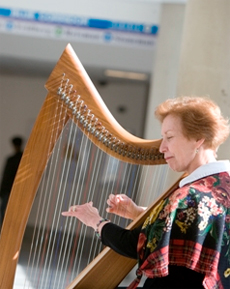fitness news
![]() ,
,![]()
Font size Women’s Health
Healing With Harmony: Music In Medicine
– Reported, April 26, 2013

GAINESVILLE, Fla. (Ivanhoe Newswire) — Whether its pop, hip-hop, country, or classical, we all have favorite songs that make us move or simply move us. But could music help as we battle different diseases and conditions?
Danielle Decosmos stage is a hospital room.
It just uplifts you, cancer patient, Virginia, told Ivanhoe.
The hospital volunteer plays for cancer patients like Virginia. Her husband David says
It does a lot towards helping you get the right attitude to heal, instead of feeling down and sorry for yourself, Virginia’s husband David, told Ivanhoe.
I do see a change often.” Musician Danielle Decosmo, told Ivanhoe. “I definitely think music helps people heal.
Board Certified Music Therapist Elizabeth Stegemoller knows it does.
Board Certified Music Therapist Dr. Elizabeth Stegemoller told Ivanhoe, Music stimulates multiple areas of the brain.
The neuroscience PhD specializes in Parkinson’s and says walking in time with music can help patients overcome walking difficulties.
If you have a person with a motor disorder, you can use music to help facilitate movement, explained Dr. Stegemoller.
She tells us after singing training, Parkinson’s patients speech can improve too.
A program at Saint Louis University is testing if music improves cancer treatment by decreasing patients’ stress. Research at the University of Kentucky found it did reduce surgery patients pain and recovery time. And its been shown to increase Alzheimer’s patients cognitive function. Stegemoller says, more research is needed to find out what music changes in the brain.
Theres a lot of theories out there as to why its working, so now those theories need to be tested, Dr. Stegemoller, said.
In the meantime, music seems to be making Virginia’s treatment a little more bearable.
You just feel good, Virginia said.
Music programs for vets with P.T.S.D. are showing promise. A study funded by the VA found vets given six weeks of guitar lessons reported a 21 percent reduction in overall symptoms and a 37 percent increase in health related quality of life.
FOR MORE INFORMATION, CONTACT:
Elizabeth L. Stegemöller, PhD, MT-BC
[email protected]